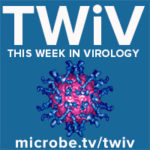Vincent and Rich return to the University of Texas Medical Branch at Galveston to speak with Dennis Bente, Shannan Rossi, Nikos Vasilakis, and Scott Weaver about their work on viruses transmitted by mosquitoes and ticks.
Hosts: Vincent Racaniello and Rich Condit
Guests: Dennis Bente, Shannan Rossi, Nikos Vasilakis, and Scott Weaver
Click arrow to play
Download TWiV 587 (76 MB .mp3, 126 min)
Subscribe (free): iTunes, Google Podcasts, RSS, email
Become a patron of TWiV!
Links for this episode
- Measles virus vectored chikungunya vaccine (J Inf Dis) 56:16
- World Reference Center for Emerging Viruses and Arboviruses 1:16:50
- Insect-specific alphavirus vaccine vector (Nat Med)
- Legacy of arbovirus hunters (Viruses) 1:33:40
- Electron microscopy for novel arboviruses (Viruses) 1:25:44
- Sylvatic dengue (Am J Trop Med Hyg) 1:37:30
- Timestamps by Jolene. Thanks!
Intro music is by Ronald Jenkees.
Send your virology questions and comments to [email protected]


Your updates about nCoV-2019 have been enlightening and helpful in combating the misinformation that inevitably follows an outbreak like this (586 was perfect!). Can we expect the next episode on the topic next week?
More SARS-CoV-2 coming on episode 588!
Nikos, I ceel certain I have seen chasing ticks in the field, here in Northern California. Is that possible?
no mention of 2019NoCv?????
Hi,
I have been listening to TWIV on and off for 3-4 years now. I didn’t think you would ever be discussing sylvatic cycles of arboviruses which is what my PhD study involves on St Kitts. You seemed to show a genuine interest from 1h35minutes in to sylvatic cycles which are somewhat of a niche area. I thought you might also be interested in my review of, “Sylvatic cycles of arboviruses in nonhuman primates.” It is long, and focuses on CHIKV, DENV and ZIKV, but it is mostly presented in tables and figures and there is a good bit of virology in it including future threats. Listening to this episode put a big smile on my face on my walk to work in the wind and the rain of Yorskhire, UK.
Hope you don’t mind my shameless self-promotion of my own work but someone has to do it!
Cheers,
MATT
https://parasitesandvectors.biomedcentral.com/articles/10.1186/s13071-019-3732-0
I love all virology, and try to cover as much as possible. Always been interested in sylvatic cycles. Thanks for the link.
Dear TWIVsters,
Thank you for the excellent science based info on the COVID19 situation. I am an infectious disease doctor and would like to point out an important factor in diagnosing this infection (and all respiratory pathogens that use nucleic acid probes for testing): specimen collection. This of particular concern now that China has transitioned to a much more problematic ‘clinical diagnosis’ based more on clinical symptoms that PCR testing. While it may seem trivial how a healthcare worker jams a swab in someone’s nose or throat, technique is important. If anterior nares (front of nose) swabs or ‘side of mouth’ swabs are done rather than true posterior nasopharynx or oropharyngeal swabs, the sensitivity drops-dramatically! We have shown this to be true repeatedly with diagnosis of influenza and other respiratory pathogens, and I am disappointed it has not been mentioned more in discussions about the PCR tests “MIssing” the diagnosis, and stories about people who were “positive, then negative, then positive again”. We often see patients admitted from the ER with the (perhaps carelessly) collected flu test who miraculously are Flu positive by the time they are admitted. Like SO many cultures and diagnostics in infectious disease, specimen collection and handling is critical. warn my patients about the unpleasantness of a nasopharyngeal swab, and (jokingly) tell them if it doesn’t cause a “wincy face” reaction, we have collected specimen from where the viruses reside. Thanks for helping to get the word out. P.S. I am sorry Vincent feels MDs “are not scientists”. While most of us are not researchers, to be sure, THIS M.D. certainly knows the mechanism of action for acyclovir,,. and MANY other mechanisms for the hundreds of antimicrobials, etc I prescribe. I’m sorry if so many of your med students have already lost the love of science that inspires many of us to choose our profession. It’s the science and the “Cool Case” WOW moments that get us through the day many times. Thanks for promoting the science and all things Microbe